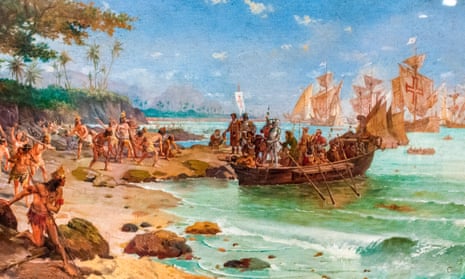A campaign pledge to build a museum in Lisbon dedicated to Portugal’s colonial history has sparked a debate over Portuguese national identity, the nature of historical memory and the question of collective guilt.
The controversy centres on the so-called Age of the Discoveries – the period starting in the 15th century when expeditions by Portuguese navigators helped the country lay claim to territories stretching from Asia to South America.
The period is widely regarded as both the apex of Portuguese history and the bedrock of national identity. But a growing chorus of critics has begun to question it, drawing attention to the crimes committed in the service of Portugal’s colonial project.
The current row has its origins in last year’s mayoral campaign, when Lisbon’s incumbent mayor, the socialist Fernando Medina, drew up a list of 25 tasks he hoped to accomplish if re-elected. The list included the idea of building what was initially dubbed the Museum of the Discoveries. The document provided few specifics, giving neither the location nor exact content of the future museum and saying only that the space was to cover the “most and least positive aspects” of the Age of the Discoveries and “include an area dedicated to the topic of slavery”.
The proposal went largely unnoticed until April, when more than 100 Portuguese and international academics released an open letter criticising the proposed name as an “obsolete, incorrect expression, filled with wrong-headed meanings”.
That letter, which appeared in the Expresso weekly, opened the floodgates for a slew of opinion pieces and TV roundtable debates, with participants coming out for and against both the proposed name and also the very principle of such a museum.
“It would only reinforce Portuguese colonial ideology, which portrays that period as heroic and simply glosses over the glaring issues of slavery, mass killings and other abuses,” said Joacine Katar-Moreira, a researcher at the University Institute of Lisbon and co-author of an open letter criticising the proposal that was signed by 100 black activists. “There are already so many statues and monuments paying homage to that moment in history. We don’t need another one, which, like the others, would be an instrument for stroking national self-esteem.”
Katar-Moreira and other activists would like to see funds earmarked for the museum put instead towards a monument honouring the victims of slavery.

Portugal was the leading player in the Atlantic slave trade, its galleons thought to have transported nearly half of the total 12.5 million enslaved Africans. (The British were a distant second, trading 3.2 million people.) Portugal has, however, long cast itself as the “bom colonizador”, or good coloniser, citing the fact that inter-racial relationships flourished in Brazil and Cape Verde as proof that its colonial practices were somehow “softer” than those of other European powers.
Historical evidence refutes such a reading – a point stressed by those who oppose the proposed museum. Other commentators have bristled at the suggestion that Portugal has anything to be ashamed of.
“It’s not possible to erase history,” the columnist João André Costa wrote last month in Público newspaper. “It happened. It existed. We can’t go back in time … and we don’t have anything to beat ourselves up about, kneeling for 100 years, with downcast eyes and hearts.”
Even the prime minister, António Costa, whose family has its origins in Goa, Portugal’s former colony in India, weighed into the debate. He said in a recent interview: “We mustn’t have a complex, but rather pride in being able to deal, in Portugal, with that period in history when we undoubtedly made our biggest contribution to the world.”
The Lisbon authorities have maintained a low profile throughout the debate, except, according to local media reports, to float potential alternative names, said to include the Museum of the Discovery – without the plural – Museum of the Expansion and Voyage Museum. Requests for an interview with Medina went unanswered.
With the fate of the museum still unclear, the argument looks likely to continue, stoking a debate many regard as long overdue.
“I think it’s a useful debate but I think it needs to happen in a measured way, and not harden into the extreme positions we’ve seen on both sides,” said the director of Público, Manuel Carvalho, who in June wrote an opinion piece entitled The Heavy Burden of Being Portuguese.
“I’m completely in favour of us talking about the dark side of the Age of the Discoveries, about the things that weren’t taught to us in school, where we only heard about the heroic side. But you can’t demand a society to change overnight.”
